Instagram Q & A with Peace Hyde: Fighting against the odds (May 30)

Day after day, African women keep breaking boundaries and creating an impact in their respective professions. Who says you can’t do the same? Sometimes we might encounter a hitch during our journey, but as Motherland Moguls, we have to keep fighting against all odds and let people know that we’ve got this! Award winning presenter and TV host Peace Hyde is contributing to the narrative of growing female power on the African continent. Through her work, she encourages young African women to be bold and break barriers to achieve their set goals. Join us on Instagram for a Q & A session with Peace Hyde on Tuesday 30th May. Peace will be sharing her entrepreneurial journey with us, and answering all your questions about fighting against the odds. [bctt tweet=”Join @Peac_hy for an Instagram Q & A on May 30 to discuss fighting against the odds” username=”SheLeadsAfrica”] We will be giving away a FREE cheat sheet with Peace Hyde’s top 10 lessons for everyone fighting against the odds. Register below to get your copy. Instagram Q & A Details: Date: Tuesday May 30th 2017 Time: 1pm Lagos// 2pm Joburg// 3pm Nairobi Where: https://www.instagram.com/sheleadsafrica/ About Peace Peace Hyde is the Forbes West Africa Correspondent. She is most widely known for her role as host of the flagship Forbes Africa TV show, “My Worst Day with Peace Hyde”. Some of the guests on the show to date included Africa’s richest man, Aliko Dangote and second richest woman in Africa, Folorunsho Alakija and many more. Peace is scheduled to launch a new show “Against the Odds” which will feature appearances from prolific African women who are recognised for their accomplishments in business or career.
Emefa Quashie: From beauty queen to farmer and social entrepreneur

[bctt tweet=”Mamagah Farms is an agricultural social project run by beauty queen Emefa Quashie” username=”SheLeadsAfrica”] It’s not every day that you hear the story of a beauty queen owning a farm. But the story gets bewildering when you notice that instead of just employing people to work on the farm (like some “modern” farmers do) she goes hands in and knee deep -getting her well-manicured nails in groveling dirt as she furiously uproots and plants, as she waters and nurtures and as she satisfyingly harvests and reaps. Meet Emefa Quashie. A present farmer, social entrepreneur and an erstwhile beauty pageant winner. When she’s not furiously uprooting and planting on her farm (Mamagah Farms), she is lost in her studies for her MBA in Marketing or running Universal ChildCare Foundation, a non-profit organization that supports needy children. SLA contributor Emma Kwenu Smith caught up with Emefa to get some insights on how to dominate in an unpopular agriculture career for modern young women and simultaneously use it to make a social impact. Tell us about Mamagah Farms. Mamagah Farms is a social project that mobilizes and empowers rural women farmers to adopt modern technologies in farming. We want to commercialize agriculture in rural communities in southern Ghana. Mamagah farms was established in 2015 with the main aim of empowering women economically through commercial farming and creating support schemes. These schemes create opportunities for smallholder farmers to improve their livelihood. Currently, we work with female smallholder farmers in rural communities within the Southern part of Ghana. Simply put: We farm, we train and we support. There are so many avenues for social entrepreneurship -why agriculture and what was the innovative idea behind Mamagah Farms? I was born into a farming community, and my mother was a small holder farmer so I spent a lot of my days on the farm assisting her. Unfortunately, along the line I grew up with a warped misconception about agriculture. Growing up in a rural community, I always thought farming was for the poor and uneducated -after all, many folks there turn to farming to be able to feed their families and also make an economic living. However, over time I came to appreciate the relevance of agriculture and numerous opportunities it presents to the youth. Mamagah Farms was born out of this realization. This is why I decided to take up farming –to send a message to the young women. Do you plan to diversify what you produce and expand to include other parts of the country? How are you preparing for this? With over 200 acres of land in the Volta Region of Ghana, we specialize in growing and harvesting in maize and pepper. Unfortunately, and as is the same with any start-up, not having enough funds can slow down plans of scaling up. We are pitching for investors and hopefully, we would be able to work at optimum capacity, making full use of the land. This way, we will be able to diversify our produce and grow a variety of crops to suit both local and international demands. Funding is everything especially for an entrepreneur who wants to leverage on technology to make farming simple and easier. There are plans to expand to other parts of the country and even West Africa. [bctt tweet=”Funding is everything especially for an entrepreneur who wants to leverage on technology” username=”SheLeadsAfrica”] How does your business as a social venture empower local women farmers? Mamagah Farms is just like social entrepreneurship project. We apply business principles to solve societal problems. What we noticed is that there is potential for rural women farmers to cultivate on a bigger scale and learn the best farming methods which would ultimately impact their economic livelihood. Realizing this, we use the profit from Mamagah Farms for investments. Apart from financially supporting these farmers to purchase inputs and commercialize their farms, we also partner with local organizations to provide training and extension sessions for these women. Most of the women who work with us are single mothers and while we want to fight poverty and promote empowerment, we want these women to have enough to afford to educate their children. An empowered woman means an empowered family and ultimately, an empowered nation. What challenges have you faced with Mamagah Farms and its related social projects? My biggest challenge has been reorienting the minds of the local folks. As hardworking as they are, the tradition has created a certain mindset towards change. A typical example is technology. When you suggest the use of tractors, some believe that using tractors may disturb the peace of their ancestors. With such a mindset, how can we grow? But it is not enough to recognize a challenge and leave it there. We take the women farmers through training programs, where we address these challenges. We show them concrete examples of how farming is done in first world countries and how we can get there. Culture and tradition can have a hold on people’s mindset, and it is important to give them the needed exposure in order to disabuse this mindset. Why should more women explore the prospects in agriculture in Ghana, and Africa? In recent times, women are defying the odds and taking more risks in their careers. Why should agriculture and agribusinesses be any different? Can a woman not own a 10,000 acre farm and work on it herself, while managing others to work as well? Agriculture has never been and is not a reserve of men. Our natural disposition as women makes us more inclined to be the better farmers, we are nurturing and detail-oriented. This is an important quality. There are several opportunities in agriculture we can take advantage of. From crop planting through to the distribution of produce, there are endless opportunities to explore. Food is a necessity. Africa has arable land and other resources, and there are always opportunities to meet the need for food produce. If you get such an opportunity, why say no? [bctt tweet=”Agriculture has
‘57 Chocolate: How to start a chocolate company on a budget in the Motherland
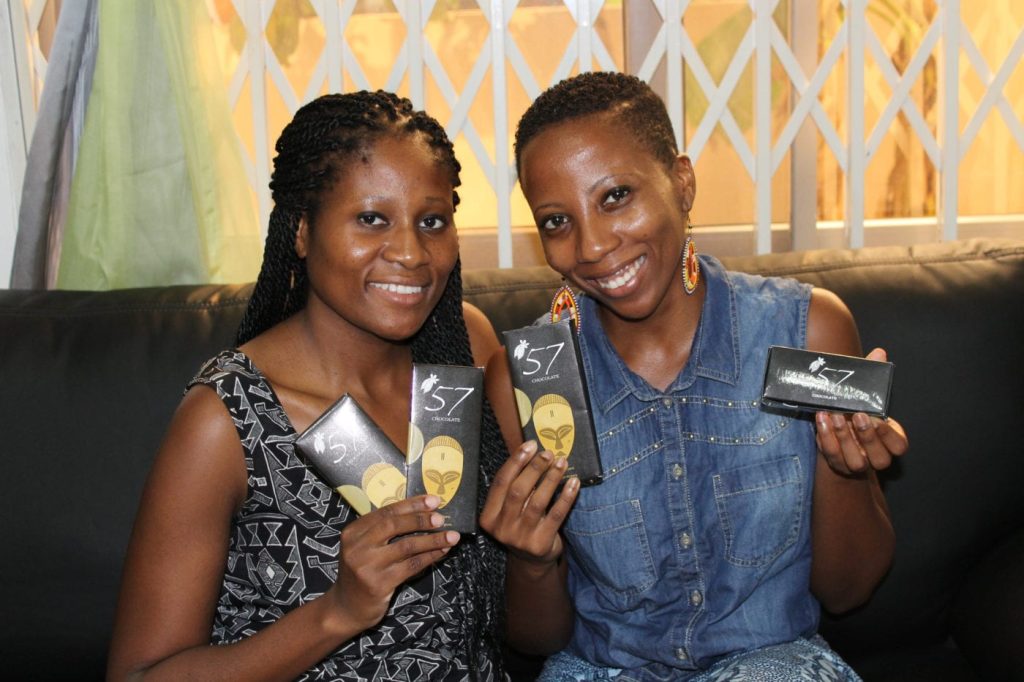
[bctt tweet=”The Addison sisters saw the need for a Ghanaian chocolate company before launching ’57 Chocolate” username=”no”] As the saying goes “an entrepreneur is someone who identifies a need in a market and finds a way to fill it”. This is what Priscilla and Kimberly Addison did when they realized that though Ghana is the second largest producer of cocoa in the world, the country produces little chocolate. Having recognized this, the sisters saw an opportunity to start an artisanal premium chocolate making company which they named ‘57 Chocolate –short for 1957, the year of Ghana’s Independence. The sisters upon starting the company in January 2016 applied for the 2016 Tony Elumelu Entrepreneurship Programme for Manufacturing where they were selected as one of the winners. This programme provided them with a small grant and networking opportunities to assist them in pushing their company further. Now, their aim is to set an example and demonstrate to the world that Africans can create products of the highest excellence and quality. What motivated you to choose this industry? Having spent time living in Geneva, Switzerland, we thought it was strange that Switzerland is known for its chocolate yet doesn’t grow cocoa, the core ingredient in chocolate. Meanwhile, Ghana is the second largest producer of cocoa, but produces very little chocolate itself. We saw a vast need for manufacturing of chocolate in Ghana and across the continent of Africa. In Ghana, the candy shelves of supermarkets and malls are overflowing with foreign chocolate bars, many undoubtedly made with Ghana’s very own cocoa. Having recognized all this, we were determined to use Ghanaian cocoa to create a Ghanaian brand of premium chocolate that is reputable locally and internationally. Chocolate really peaked our interest because it allows us a lot of creativity. We get to experiment with different factors such as how dark to roast the beans, the percentage of cocoa to include, and creating different flavors and pairings (e.g. sea salt, coconut shavings etc). We also love chocolate because it really is a healthy treat if you choose chocolate that is high in cocoa content. At ’57 chocolate, cocoa, as opposed to sugar, is always the first and main ingredient in our dark and milk chocolate. What steps did you take to start the company? What was/is your niche? We started the company before we even had a name for it. The idea came about in 2014; however, we made our first batch of chocolate in 2016. In between this time, we took courses on chocolate making and confections and trained with people in the field. We also did a lot of research and reading on the industry then we developed our chocolate recipes through trial and error. We would give our small-batch chocolate to family and friends who happily agreed to taste test. Also, we spoke to people already working in the industry to seek advice and support. [bctt tweet=”We developed our chocolate recipes through trial and error @57chocolategh” username=”SheLeadsAfrica”] Being from Ghana, it was important for us to create something that we were passionate about and that stood for a bigger purpose. Building our brand has been intricately tied to our desire to see Africans create products of premium value with the abundance of resources available. Hence the name ’57 Chocolate, which is short for 1957, the year of Ghana’s independence. 1957 was a revolutionary year for Ghana, not only because it was freed from colonial rule, but it is the year that gave birth to the nation’s “can do” spirit. The name ‘57 is meant to inspire a reawakening of Ghana’s 1957 “can do” spirit. From 1957 onwards, Ghanaians were creating and developing their own industries and products which resulted in a massive industrial boom. We want to return to that. ‘57 Chocolate aims to inspire the people of Ghana and Africa, to create and develop made in country products of high quality. Our niche is comprised of individuals who are looking for premium handmade chocolate that is made from bean to bar, and those keen on supporting Ghana’s industry by buying Made in Ghana products. How did you fund the company? Are there companies willing to invest in this industry? We funded the company with our personal savings, and with a few contributions from friends and family. We didn’t start with much, and we’ve been bootstrapping our way through this process. You have to make adjustments and sacrifices. As a silly, but true example, that pricey face toner from that fancy store we used to love for healthier-looking skin has now been replaced by a simple lime or lemon wedge. It surprisingly works just as well, though! It was important for us to commit to properly investing in our own company. Additionally, we applied and were selected as a winner of the 2016 Tony Elumelu Entrepreneurship Programme for Manufacturing which provided us with a small grant and networking opportunities. There are definitely numerous companies willing to invest in cocoa processing. It is, after all, a multi-billion dollar industry. What did you need academically and financially to qualify to start the company? There aren’t really any academic qualifications needed to start the company. Neither of us (Kimberly or Priscilla) has a background in chocolate making. We did need to take courses and get training on how to make and mould chocolate. How did you brand your company? What were your business and/or marketing plans when you launched the product? Our company is an artisanal premium chocolate company, as we wanted to fulfill this unique void in Ghana. Most importantly, we aim to keep Ghana’s cocoa in its truest form. Our chocolate is handmade in small batches, starting from sorting the cocoa bean by hand and processing it into the chocolate bar. Our chocolate is rich in cocoa, and made without any artificial colors, flavors, preservatives or weird things that are hard to pronounce. Additionally, our chocolate challenges the status quo of luxury chocolate being only a product of Europe. We are
Growing and marketing your brand via social media – The tale of 5 #MotherlandMoguls
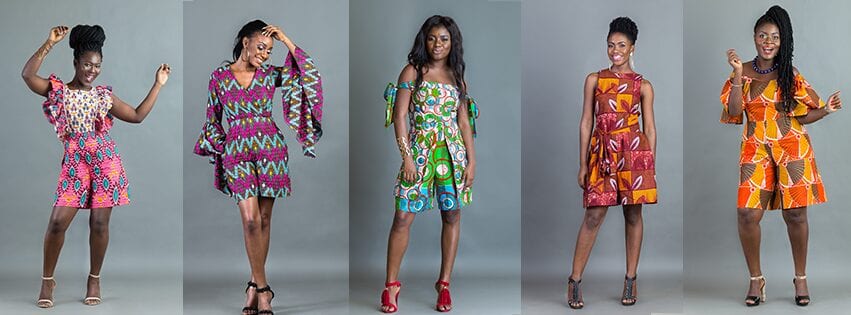
[bctt tweet=”When used right, digital media can be harnessed to make a direct impact in the society” username=”SheLeadsAfrica”] It is not often that one catches five aspiring women in the same spot. Well, maybe it’s often, but what are the chances of finding them engaged in a fashion project to raise awareness and funds for charity? These five #MotherlandMoguls are part of the ongoing Romperade Campaign, an online fashion charity event to raise funds for Living for the Needy Foundation. SLA contributor Emma Kwenu Smith caught up with the five who have successfully grown their brands online, to ask them quick questions about the impact of social media marketing on their businesses. What’s the role of social media in charity organizations and specifically for your brand? How has social media given you exposure as a brand/charity foundation? Caritas Aryee, Founder, Tatas and Friends Foundation. You would notice that, largely, Ghanaian charity foundations have always run on traditional media. It’s easier to hear a radio ad calling for donations for the Osu Children’s home etc. rather than a social media campaign for funds. This is the exact reason why Tatas and Friends Foundation has been a game changer in the industry. We started with social media and still the story has not changed. It has been a huge boost for us, and we encourage others to do same. First off, our publicity is done via social media. It is easy to get Kenkey for the Needy, (which is our major fundraising project) trending on platforms such as twitter and IG. Since we are a charity organization, we are unable to invest in traditional media for publicity. However, through social media, we receive access to grant interviews on TV and radio. In doing so, we have been profiled alongside other solid brands on platforms such as Starr Woman Project, TedX campus, Reach for Change and many others. And to think this publicity is free! We just had to capitalize. The second bit of using social media is that we are able to reach out to people both locally and internationally to raise money. People we do not even know, reach out to us so that they can donate to the cause. It is amazing! Social media is a powerful tool, it has shaped the Living for the Needy brand and has given us a lot of exposure. How do influencers promote a brand and how rewarding is it to include them when building your brand online? Jessica Naa Adjeley Konney, Fashion Blogger, Trends&Blendsgh. Influencers have become the new voices of brands —they are already largely recognized on social media for carving a niche. At this point, they have grown an audience that is interested in every content they churn out which is great for people who would like to patronize their services. [bctt tweet=”If you’d like to speed up the process of advertising a new brand, influencers are the way to go” username=”SheLeadsAfrica”] Being an influencer myself and having featured influencers as well, I can say that the exposure they give to a brand is immense. Featuring an influencer takes many forms —you can have them use and review your products and put up posts on social media. They can also be included in events and can feature in huge campaigns so that it gains traction. How do you know which digital audience to engage with for your brand and how do you decide which social media platform to use? Constance Efua Mensah, Creative Director, EfuaStanzz Fashion. It starts with knowing the general audience target for my brand. We are more skewed towards women’s clothing but basically, all our marketing is geared towards the confident woman. In that light, it is important that we build an identity that resonates with our targeted audience. [bctt tweet=”Choosing one social media platform starts with knowing & understanding your audience” username=”SheLeadsAfrica”] Images are essential for my fashion brand —it helps clients (both potential and existing) know what my brand is capable of providing. After all, to be comfortable enough to purchase a dress, you need to see it and assess it from all angles. As such, I mostly use Instagram and Facebook as a means of communicating to my audience. Facebook has a wider reach, meaning more people see our posts and it also allows for effective picture/video sharing. Instagram also has a beautiful and simple approach to marketing. Content, particularly on Instagram, is simply more shareable, easier to understand, and far more universal than other types of content. Also, it is full of people eager to connect with a brand on a more intimate and tangible level. Does social media directly affect your client base? Lamisi, MakeUp Artist, Lamisi Artistry. Truth is, I do get over 80% of my clients via social media. The rest is through word of mouth. [bctt tweet=”MUAs need social media, people need to see your work before trusting you with their faces” username=”SheLeadsAfrica”] I leverage heavily on Instagram particularly so that people see the images —it is an excellent platform for sharing all my works. However, the industry is very competitive, as such, it is important to make sure that your images are of good quality. Else, how will you stand out and win potential clients over? For brands like Coca Cola, Vodafone etc. there may not be a very direct correlation between the sales you make and your social media investment. However, for us in the beauty industry, it’s very plain. [bctt tweet=”Social media dictates our potential client base and ultimately, it is where we get our clients” username=”SheLeadsAfrica”] The more posts on your social media pages, the better? Why? Maud Mensah, CEO, WigClub That statement is indisputable. The more you post and engage your audience, the more visible you are. However, you do not want to share too much information that it suffocates them and drives them away, and you also don’t want to share so little that they become disinterested. It is important to find the right balance for your brand. As
Aisha Akiti: Your hard work can put you anywhere in the world
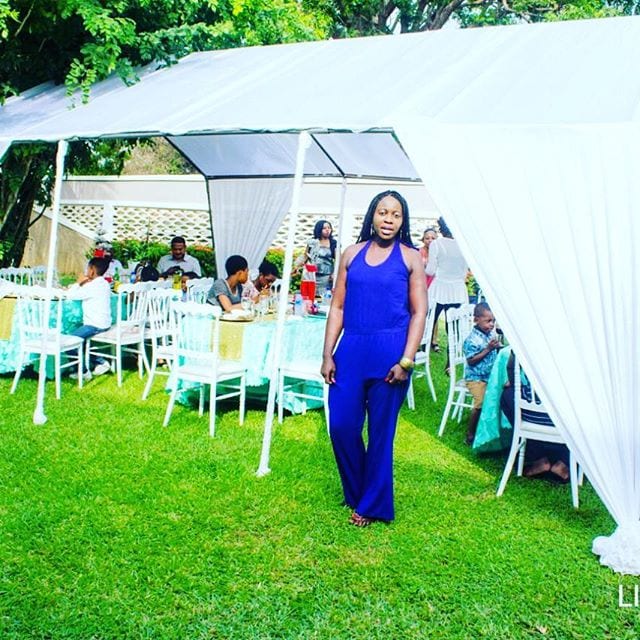
[bctt tweet=”The best way you can predict your future is to create it – Aisha Akiti” username=”SheLeadsAfrica”] Meet Aisha Akiti, CEO of Missashleybakes and Eventbyashley, a baking and events planning company. This business was founded a year ago after graduating from her degree. Being a mother of two kids there was no luck finding a job so Aisha decided to create one for herself. In fact, by the age of 10, Aisha was already selling candy, biscuits and doughnuts to her family and friends. Aisha’s favourite part of the business is that she is able to put her passion into reality. She also loves the daily interaction with clients as she helps them choose cakes and styles that match their personalities with the event. The bubbly entrepreneur from Tema, Greater Accra region of Ghana says even though she has had her business for a year she is still excited about it. We interviewed Aisha Akiti and here is what she had to say…. What do you bring into baking and styling that makes your business unique? I provide each client with signature designs and taste, I also treat clients like friends and let them get to know me. What has been your greatest achievement so far? My greatest achievement so far is that I’m able to create a job for myself. After graduating from university, I had no hope finding a good job. In addition, I am proud of the fact that I’m able to provide short-term job opportunities to other young people as and when my business allows. How do you plan on taking your business to the next level? I intend to take my business to the next level by introducing new products and services and hiring a social media manager to build my online reputation and engaging customers. Getting a mentor, someone who’s been there, done that and learned lessons the hard way is indispensable. Also important is having a good team, providing them with good working environment and training. I believe when the people around you improve, your business will improve. What four qualities do you think every young entrepreneur in your industry should have? I believe every young entrepreneur in my industry must possess these qualities: Passion and leadership skills: Your passion will drive you to turn your ideas into reality. Good numerical skills: You will need to measure ingredients and other basic items. Creativity: Anyone can bake but to stand out from your competition the element of creativity is necessary. With creativity, you’re able to offer something different from the crowd. You must be able to work under pressure. Baking is a lot about timing and it’s important to grasp the right time that may cause unnecessary stress. You’ll also need the ability to face the immense amount of stress when the end product does not turn out as expected. Teamwork is also extremely important in a kitchen. You need to be able to work with other people to make beautiful creations on a large scale. What has been your overall experience in this industry? My overall experience in this industry is that the best people, no matter who they are, who they know or where they are on the ladder can succeed with their work being recognised. Your hard work can put you anywhere in the world. Fear must be removed and you must focus on getting to where you want to be as fast as possible. [bctt tweet=”No matter who you are, you can succeed with your work being recognised” username=”SheLeadsAfrica”] If it takes one skill to be the best, what skill would you choose? Why? I would choose communication skills because having a good ability to communicate will help you to build up relationships, present ideas and most importantly make you a better leader. With good communication skills, you will be confident to talk and present your thoughts in public thus boosting your chances of success when you have to negotiate or persuade a client. A good leader is not the most intelligent one but the one who can inspire everybody the most. And how can you motivate people around you? Mostly using your words by communicating with them. What do you think other young women can learn from your start-up story? Young women can benefit from my start-up story knowing that in life you don’t have to depend on anyone, you can create your future. The best way you can predict your future is to create it. You are your own boss knowing how to bake, design and style an event with confidence, you can be anything you desire with hard work and determination. If you’d like to share your story with She Leads Africa, let us know more about you and your story here.
How Joselyn Dumas inspires you to achieve your career goals
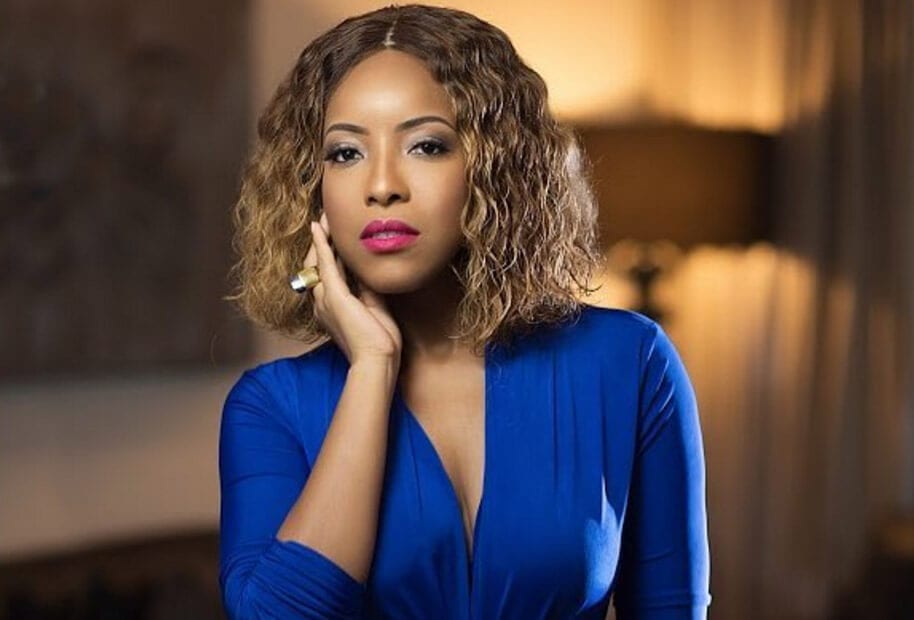
[bctt tweet=”@Joselyn_Dumas inspires herself and people like me every day. Be like Joselyn!” username=”SheLeadsAfrica”] When I was tasked to write an article on how Joselyn Dumas inspires us to achieve our career goals, I was stumped. Simply because of all the Ghanaian celebrities (most of whose lives I do not give much thought to or follow on a regular basis, for that matter), Joselyn Dumas was part of my B-listed celebrities. Honestly. But research and knowledge always changes perspective and perception, and after reading and reading all the savoury and unsavoury articles alike, I am delighted to announce that if you were like me, you can be a changed girl now. Unlike what others may think, Joselyn Dumas can actually inspire you to achieve it all. Here is how: 1. Guts She had the guts to quit her job as a paralegal in London to pursue her dream of being a TV personality in Ghana. So how do you contextualize this? It’s simple. Are you stuck in that dead end job, unhappy with your life and atrophied dreams? Leave and don’t look back…with caution please. Follow your passion. Go to your Ghana to be what you want to be. Be like Joselyn Dumas. 2. Body positivity As a woman, Joselyn is endowed —she is all sorts of curvy and beautiful. Unfortunately, some people in the public refuse to stop staring at those hips and start focusing on what she does instead. She has been at the centre of media attention because men won’t stop gawking and ladies will not stop hating because their men are gawking! In spite of this, Joselyn keeps a calm, unruffled demeanour and unashamedly wears clothes that flatters her —not caring what anyone thinks. So for you reader, wear what you want to and do not be ashamed of that body. On a deeper level, this goes to say that you should be true to yourself. It is the first wise step which when taken, will resonate positively in your career goals. [bctt tweet=”Leave and don’t look back…with caution please. Follow your passion. ” username=”SheLeadsAfrica”] 3. Wellness Although the cynical Ghanaian public have accused Joselyn of passing off a gastric by-pass as a weight loss plan to justify her figure today, I choose to remain oblivious and believing. Of course, Joselyn knew then that the Ghanaian public can be unforgiving when it comes to overweight TV personalities, so she made the move to join the Weight Watchers’ Club. She had a career goal in mind, and made physical preparations to be suitable for that role. You also have that career goal in mind? Are you reading, learning or losing weight to make the move easier? Consider doing what it takes to get where you want to be. [bctt tweet=”There is a place for a social work. Not every day, yourself. Sometimes, others.” username=”SheLeadsAfrica”] 4. Giving back Being a believer in social action, Joselyn volunteered alongside Lucy Quist, MD of Airtel Ghana to participate in a STEM (Science, Technology, Engineering and Mathematics) initiative. Aside that, she has the Joselyn Canfor-Dumas Foundation which focuses on social issues such as providing for children, widows etc. What should this mean to you? It simply means that there is a place for a social work. Not every day, yourself. Sometimes, others. “A noble leader answers not to the trumpet calls of self-promotion, but to the hushed whispers of necessity.” ―Mollie Marti 4. Sharing your passion Forget that Joselyn is brand ambassador of Range Rover Evoque and Jobberman Ghana. Forget that she was the host of “The One Show”. What does Joselyn have to call her own? There is a crop of entrepreneurs sweeping across the African continent and Joselyn is one of them. She is following her passion to make sure those who share in it also have jobs to do. Joselyn is the founder of Virgo Sun Production Company Limited. What about you? Will you feed the entrepreneur in you? Will you allow others to share in your passion? [bctt tweet=”Are you acting professionally in any role you are playing like @Joselyn_Dumas?” username=”SheLeadsAfrica”] 5. Perfecting your profession Finally, you remember the movies “Perfect Picture” or better still, how about “Love or Something Like That”? You don’t? That’s fine. But you cannot tell me that you do not remember the sensational “Adams Apple” which featured Joselyn as leading cast member, Jennifer Adams. Due to this and other appearances, Joselyn has been branded as part of the professional actresses who are glamorous and best dressed. I did not make this up. Nkonkonsa.com did. So my question is this: Are you acting professionally in any role you are playing? Are you executing that role to perfection? I wish I had a slick conclusion. But this cuts it for me- Above lies the story of Joselyn Dumas. She inspires herself and people like me every day. Be like Joselyn. She can inspire you too!
Senanu Arkutu: I decided to follow a passion that I hadn’t realised was a skill
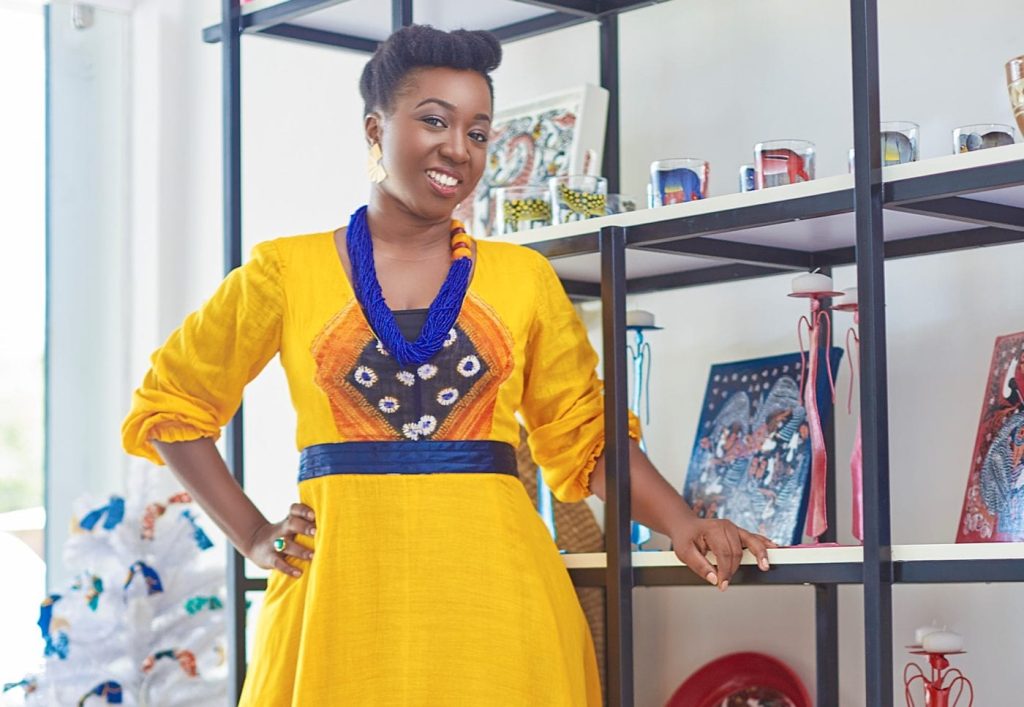
[bctt tweet=”Senanu Arkutu: The high quality is here in Africa but you have to do quality control ” username=”SheLeadsAfrica”] Senanu Arkutu is the founder and CEO of DAAR Living, an interior styling firm that is diversely African, layered and interwoven, antique and contemporary, with European and Arab influences. While pursuing a career in Reproductive Health and International Development, she realised she had a flair for interior design after decorating her own home. Spurred by the compliments she received, she gave up her day job and opened DAAR Living in 2013. Senanu is also the set designer for the hit series, An African City. Her flagship store opened November 19, 2016 in East Legon, Accra, Ghana. How does one switch from a career in international development to interior design, and what transferable skills have helped you in your new calling? Hahaha! It was time for a change after a 12-year career —that I loved, by the way. I decided to follow a passion that I had not realised was also a skill until I designed and decorated my own house, and the warm compliments started coming. Transferable skills from a career in sexual health and family planning, I find new ones every day! But the most important one to date is listening to client’s concerns and finding an appropriate solution that is sensitive to their specific needs and feelings. Conducting consultations helps. You’re Ghanaian but grew up in Southern and West Africa, which obviously have influenced DAAR Living. Where else do you draw inspiration from for your décors? …And East Africa where my personal style probably leans towards. I draw inspiration from my mum, my clients, other designers, art and culture, trends, life. What have been your highest and lowest points since starting DAAR Living three years ago? The highest and lowest points all come together in establishing our first store. I hired an established design and construction company to carry out the design changes I wanted done to the retail space. This was a team that the landlord was comfortable with as they had done some work for another retail space in the same building, which I had seen. The experience was a disaster. They were rude. Communication, follow-up and quality control were terrible and on top of that, a four-week job took them four months to complete! My rent money just went to waste (Accra landlords insist on two years rent upfront whether you are a start-up or not). The highest point was the night I laid out and merchandised my store for the first time and went outside to see what it looked like from the shop window —I had a moment! With a physical space all done up as I wanted it, and DAAR Living signboard up in lights, it suddenly seemed like DAAR Living finally actually existed. [bctt tweet=”Senanu Arkutu’s highest point was the night she laid out her store for the first time ” username=”SheLeadsAfrica”] In an interview, you voiced your desire to see African arts and crafts showcased in other ways besides a market setting or market style setting. Would you mind elaborating? I would love to see more of quality African art and crafts being showcased in all their glory in a contemporary retail, gallery-like space, and not always in a busy market where it is not easy to see the skill and beauty of the piece. You do not see this often in Ghana or the rest of the continent, except in South Africa and, now, of course, Alara in Lagos. The new DAAR Living store aims to be the contemporary retail space showcasing African functional art and craft in Accra. We want to be front and centre in this emerging story. [bctt tweet=”Senanu Arkutu: I’d love to see more quality African art & crafts in a contemporary space” username=”SheLeadsAfrica”] You’re the principle set designer for the hit African series, An African City. How did you get the deal for the show and end up collaborating with Christie Brown, who designed some of the beautiful clothes on the show? Nicole (creator of An African City) and I are good friends. We believe in each other’s work and see the value and strength in collaborating. I offered my house for use in season 1, and by Season 2 the AAC team had realised the added value of set design and how it plays a large part in story-telling. DAAR Living was better established by then, but there was no budget allowance for set design, so Nicole turned to me and Nana Spio-Garbrah of Blueprint Africa (Assistant set design). Of course, we were glad to help Nicole, and there was also the added potential exposure An African City could give. As for collaborating with Christie, when I began DAAR Living I wanted to launch a brand and begin building it and its community immediately. I knew that the products and services on offer may change slightly, several times, but the concept was clear and would remain the same. As a client and lover of Christie Brown, I could not get out of my head how pieces of mine reminded me of outfits of Aisha’s (founder of Christie Brown). So I called her with an idea for an exhibition that brought interiors and fashion together to launch my brand and she loved it! She encouraged me, offered her then new flagship store for the launch, and the rest is history. How does DAAR Living ensure on-time delivery and high quality across all its offerings, especially since décor and furniture pieces are sourced from across Africa? Good question. The high quality is here in Africa but like everywhere else you have to do due quality control. This is my job and it takes a lot of back and forth but we get there. For on-time delivery, firstly, I do not offer items for sale that are not already ‘on the shelf’ —online or in the physical store. Secondly, if a client is making a bespoke order and I think
Maajoa Yeboah: I basically started with a Facebook page, a mobile phone camera and my passion
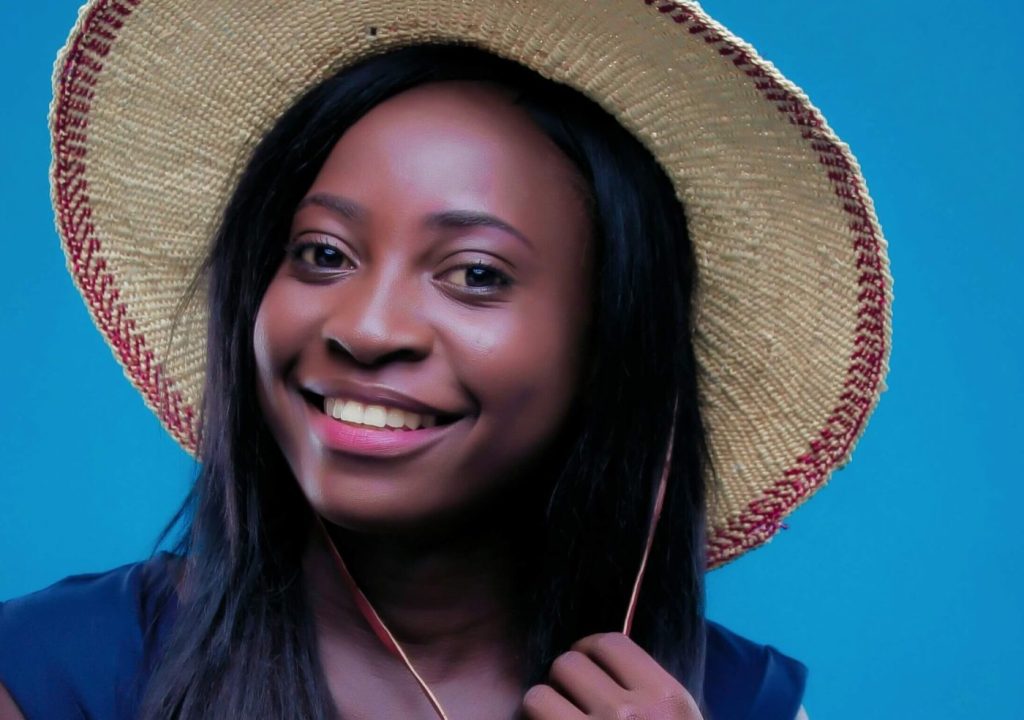
[bctt tweet=”Making accessories gives you the flexibility to still have a full time job @Maajoa_Yeboah” username=”SheLeadsAfrica”] Maajoa Yeboah makes accessories, mentors girls and is one of 30 young achievers in Ghana. Her passion and determination have paved the way as she initially wanted to work in a bank. Maajoa started her brand Asabea Ayisi while still in school, the initiative has since grown to include other projects such as the One Girl One Skill foundation. Through her work, Maajoa Yeboah ensures that she’s giving back to the community and helping other girls become financially independent. Tell us about the steps that lead to launching Asabe Ayisi. I started Asabea Ayisi whilst still a student in the tertiary institute. I basically started with a Facebook page, a mobile phone camera and my passion. Before commercializing the accessories, I was making them for myself and a few friends and family members. This was up until I started getting amazing feedback for the pieces I was creating. So I thought why not start a fashion business? This was however a great battle for myself and my family because I was an studying Accounting with dreams of being a banker like my father. My family equally had these dreams for me, I had started studying business in high school. Eventually my passion won! I built a fashion accessories brand as an accounting student with no knowledge of fashion trends and the fashion business in general. Yet, I made a conscious decision to learn all I needed to learn. Even though I made a huge load of mistakes, eventually I built a fashion accessories brand through hard work and lots of passion. Why did you decide to start the One Girl One Skill Foundation? A few years after I started Asabea Ayisi, I decided to take up a charity project. On the occasion of my birthday, I went into an orphanage and taught young girls how to make basic accessories like hair accessories, earnings and simple necklaces for themselves. I also wanted to mentor these girls. After one successful project in 2015, I started getting training requests from basic schools, churches and some community members who wanted their young girls to learn accessory-making skills. So I started One Girl One Skill foundation to reach out, train and mentor young girls on how to make accessories and also to instil in the them the relevance of following one’s passion. One Girl One Skill has since 2015 trained and mentored over 500 young girls in the eastern, western and greater Accra, as well as the central regions of Ghana. I still receive a great number of requests daily. I am hoping to organize training projects in other regions in the country and hopefully go beyond the boarders of Ghana. [bctt tweet=” @Maajoa_Yeboah has a track record of serving as a mentor to young people” username=”SheLeadsAfrica”] How did you come to be listed as part of 30 young achievers in Ghana? Why do you think you made that list? I believe my passion, hard work and commitment landed me the honour to be listed as part of 30 young achievers in Ghana. A total of thirty individuals were honoured in the categories of business and leadership, society and education, creative arts, healthcare and food, and technology and media. 2016 marked the third consecutive year of the report. It was the first time ever that an equal number of male and female achievers made the honour list. More than half of these achievers were entrepreneurs like myself. The achievers are selected by a rigorous consultative methodology that ensures honourees have actually achieved something that will be considered outstanding among peers. They also have to have demonstrated potential for greater future impact and I believe I qualified for the spot! Tell us about being selected for the US Global Leadership Coalition’s Entrepreneurial Challenge. The Global Leadership Coalition entrepreneurship challenge was open to young people from across Ghana. Business proposals were sought in the areas of agriculture, sustainable energy, climate change, education, health, and cultural industries. Some 25 budding entrepreneurs were invited to attend a four-day leadership and entrepreneurship boot camp held in Accra in June 2016. At the end, 15 entrepreneurs were selected to participate in a four-month virtual internship run by the Global Leadership Coalition. Over the course of the internship, the entrepreneurs were monitored by carefully selected mentors including myself. We were given the task of monitoring progress over a 3-month period. My role as the youth ambassador was to help each of these participants develop their leadership and entrepreneurship skills. My selection for this role was as a result of hard work and a great track record of serving as a mentor to many young people. As a mentor and a judge, how do you think mentors should effectively manage their mentees? As a mentor, I believe it is your role to help your mentee set realistic expectations. Also, if you know you will be unavailable because of business or personal travel, let them know. Encourage communication and participation and help the mentee create a solid plan of action. Help your mentee set up a system to measure their own achievements. A mentor should also be truthful in evaluations, but also tactful. Also, engage in your own learning while you are mentoring, collaborate on projects, ask questions and experiment. Share your ideas, give advice and be a resource for new ideas. A mentor should also be very much reliable because the more consistent you are, the more you will be trusted. It is also very essential for you as a mentor to stay positive; recognize the work the mentee has done and the progress made. Finally, offer feedback without criticizing. These I believe, will go a long way to help effectively manage mentees. How are you giving girls a chance to earn multiple streams of income? Teaching young girls how to make basic accessories like hair accessories, earrings, necklaces etc isn’t only imparting them a workable
Naa Oyoo Kumodzi: How to survive a lay-off
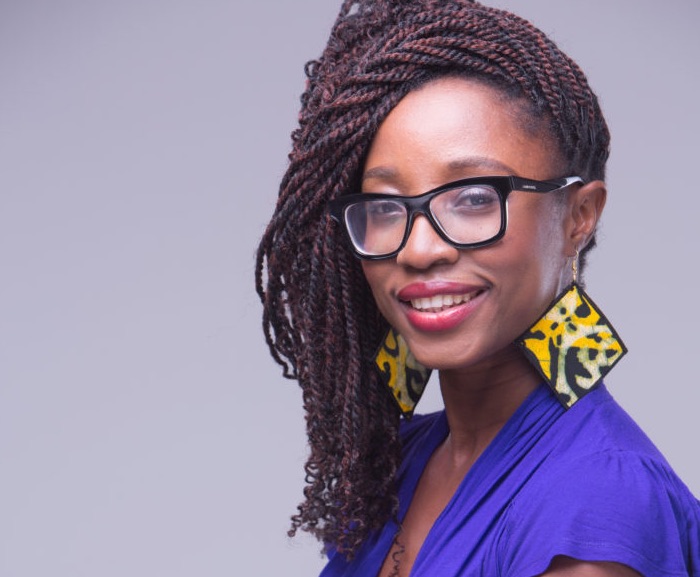
[bctt tweet=”There is no quick fix to surviving a lay-off, follow these guidelines to prepare for it. ” username=”SheLeadsAfrica”] “Everyone is dispensable in a workplace. As long as it’s not your company, then yes you are dispensable. This shouldn’t come as a surprise to anyone. If the company you work for today, decides that they are bankrupt hence they are shutting down or they are unable to pay you, what can you do? You just move on.” These were the words of Naa Oyoo Kumodzi as she spoke of her lay-off experience at Tullow Oil, Ghana after working with the company for six years. Before the lay-off, Naa Oyoo worked as an officer in the health and safety department where she was training into Occupational Hygiene. Though the layoff had been communicated to all employees worldwide and she had prepared herself for it, it still came as a shock. It is only natural for you to question the company when you realise how dispensable you are. This was what Naa Oyoo did. She was hurt and confused as to why a company would invest so much in her and still choose to let her go. Despite these natural reactions, the lay-off was not hard-hitting for Naa Oyoo compared to others who experienced the same fate. The reason is that Naa Oyoo started blogging five years ago. This job had gradually turned into an income earning source. So when one income source was cut-off, Naa Oyoo knew she had other things going on for her. Today, the lifestyle blogger, entrepreneur and social media marketer uses her experiences to educate others to prepare for the unexpectedness in life. To Naa Oyoo, a lay-off is an experience which some people have to go through. The memory of this incident rises up even after a long period of time, but it does not have to be traumatic. If you’re adequately prepared, you can survive this. There is no quick fix to surviving a lay-off but you can follow the guidelines below to prepare. [bctt tweet=”Naa Oyoo Kumodzi: Anything can happen any time, you should always be prepared financially” username=”SheLeadsAfrica”] Prepare yourself mentally and emotionally Preparation is always key. When a lay-off is communicated to you, you just have to prepare yourself mentally and emotionally. You have to ask the questions; Is it going to be me? What if it is not? If it is going to be me, what will be my first mode of action? If not, what should I do to prepare myself for any future lay-offs Should I resign soon? These are some of the mental preparations you have to go through in order to be alert and ready for the unexpected. You should also come up with an action plan that you will follow. Have multiple streams of income and never be okay with one stream of income Naa Oyoo Kumodzi may not have been aware of it at the time but starting out in blogging and creating content prepared her for the future. While she was with Tullow Oil, she managed social media accounts for companies, this was also a source of income for her. Due to this, the day after her lay-off, Naa Oyoo was not wallowing in self-pity. Rather it was another day for business as she had to rise up early and work on the accounts she managed. [bctt tweet=”Naa Oyoo Kumodzi: Anything can happen any time, you should always be prepared financially” username=”SheLeadsAfrica”] Learn about savings and investment and start investing now You cannot go through life without a dime to your name. You have to have some sort of investments and savings, no matter how small it is. As you generate income from pay-check to pay-check, you have to save some somewhere for unexpected circumstances. There are so many banks and investment companies around, it would be advisable to find one that suits you. Anything can happen any time and you should always be prepared financially. [bctt tweet=”Naa Oyoo Kumodzi: Do not be satisfied in staying in your little corner always” username=”SheLeadsAfrica”] Learn more about yourself and improve on your strengths You will need to be strong to face life’s storms. They can come at you when you least expect it. By learning more about yourself, you are able to identify your strengths and weaknesses. This will help you improve upon them and equip you into reaching your ultimate success goal. Knowing thyself is the first step to success. Given the fact that the world is a learning ground; you should learn to open yourself to explore new opportunities and experiences. Build a strong business network even whilst you have a day job Everyone needs somebody at a point in their life. Who are you going to call if you do not network? You never know when you need to call up someone. Even though you may have a day job that takes all of your time, it is an obligation to go out there. Build strong business networks, they will definitely come in handy one day. Do not be satisfied in staying in your little corner always. Learn to make new friends, go for business seminars, meet your friends’ friends. Just network! Want to see women you know featured on SLA? Tell us what amazing things women are doing in your communities here.
Anita Ottenhof: Bringing world-class luxury to Accra through Villa Monticello
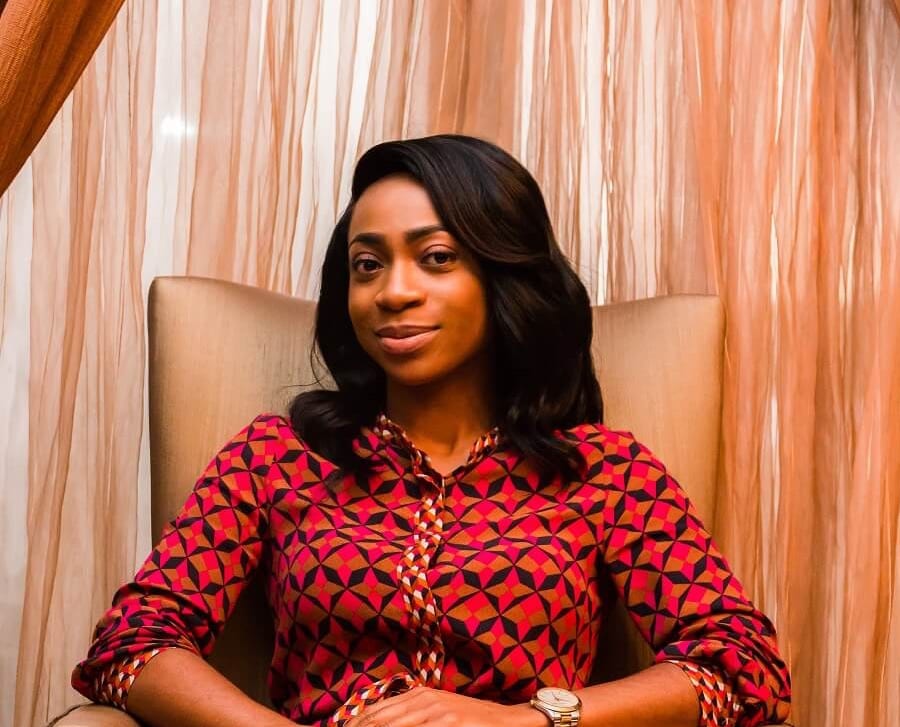
[bctt tweet=”We look for the very best talent and often for us that has happened to be a woman” username=”SheLeadsAfrica”] Villa Monticello is Accra’s premier luxury boutique hotel. It’s run by a team that comprises mainly women in leadership positions. One of them is Anita Ottenhof, she’s the Deputy General Manager at VM with nearly a decade’s worth of experience in the international hospitality and travel industries. Like most other industries, hospitality and travel tend to be male-dominated. Villa Monticello stand out despite never setting out to hire only women. They’ve just found that the best talent aligned with their goal to bring a world-class luxury experience to Ghana are women. Nothing beats that! Was it a conscious decision to have women in key leadership positions at Villa Monticello? Although we have several men on our team that have worked with us since we’ve opened, most of the leadership roles happen to be held by women. The women on our team are also some of the top talent in the world! Take for example our Executive Chef, Ruby Paintsil who has over 25 years’ experience at a number of prestigious companies in the UK, such as Sanctuary Spa, BBC Television Centre and Restaurant Associates a division of Compass UK. It is rare to see a woman as a head chef and in countries such as the US, there are reports that there are less female chefs than female CEOs. We have never said, “We only want to hire women” but we look for the very best talent whose vision is aligned with our mission to be a leader in African hospitality and often for us that has happened to be a woman. Was Accra ready for a luxury business when you launched Villa Monticello? How has Villa Monticello being received since launch? The idea for VM came about through our desire to create an establishment that paralleled some of the international 5-star niche boutique hotels that we loved in cities around the world such as New York, Marrakesh, Johannesburg, and Provence where luxury and service were not mutually exclusive. This sort of hospitality experience appeals to a very unique clientèle. Accra is a very cosmopolitan city and we believed that people who live in and travel here would appreciate our vision. It was a new concept in Accra but we have been very well received by guests and recognized by international hospitality industry vanguards such as World Travel Awards, Conde Nast Johanssens and Trip Advisor. [bctt tweet=”Villa Monticello was the first to introduce the concept of intimate luxury hospitality to Accra” username=”SheLeadsAfrica”] How has Villa Monticello changed Ghana’s hospitality industry? When we first launched in 2011, we were the first to introduce the concept of an intimate luxury world class experience in hospitality. Over the past few years, the luxury landscape has really begun to develop in Accra —in real estate, hospitality, retail, and dining. It’s still at early stage but we believe we have contributed to its growth. Customer service is another concept that is still growing in Ghanaian business. Impeccable customer service is core to VM’s values. We strive to provide an unforgettable experience for our guests. We are beginning to see a more customer centred service being adopted by others in the hospitality industry and across sectors. How has your “unsaid commitment to women” (mentioned here) translated in running your business? Although we don’t discriminate based on sex in any way, we have attracted a very powerful core group of women leaders who share the same values, international outlook and passion for excellence. The way we approach our customers is the same way we work together as a team. We are constantly meeting, reviewing feedback and making necessary adjustments as a team and as a business. [bctt tweet=”We have attracted a very powerful core group of women leaders who share the same values” username=”SheLeadsAfrica”] Tell us more about The Lady initiative, why did Villa Monticello start this? We understand that it can be challenging for many young women to get the opportunity or nurturing that they might need to excel. Working in collaboration with Ghanaian businesswoman Isobel Acquah, we launched The Lady in January as an empowerment initiative for young women aged 18 to 25. Through the initiative, young women participate in practical foundational courses covering key topics such as wellness, confidence building, financial awareness, social and business etiquette, and personal grooming. The Lady, is an effort to impart to young women the ethos and values that have driven Villa Monticello to a leading position in the Ghanaian hospitality market. At the end of the program (which ended last month), we granted internships to participants and to one promising young women at the university level, a scholarship to further pursue her education. You offer a number of services including The Koncierge and Bespoke Weddings. How do you ensure that you maintain the same values and quality in everything that you do? Our ultimate goal is to deliver exceptional service and provide an experience for our guests which is second to none. This outlook is applied to all aspects of the VM brand. We are constantly striving to play a significant role in transforming the standards of the hospitality industry in Ghana and the role of women in the industry. We also want to have a positive impact on the next generation of African women business leaders. What are three hidden treasures in Accra that visitors tend to miss? Chapter One Restaurant! Even if you don’t stay at VM, experiencing a meal at our fine dining restaurant is a must. The African fusion inspired menu combines flavors from Africa, Asia, India, and Europe using locally sourced ingredients. Enjoying a traditional tea, classic brunch or an exclusive bottle of wine from our Barrels Wine Club cellar can be a highlight for any visitor’s trip to Accra. Legon Botanical Gardens. There are very few green spaces in the city and this gem provides a necessary respite. Escape the hustle of the city for a picnic
